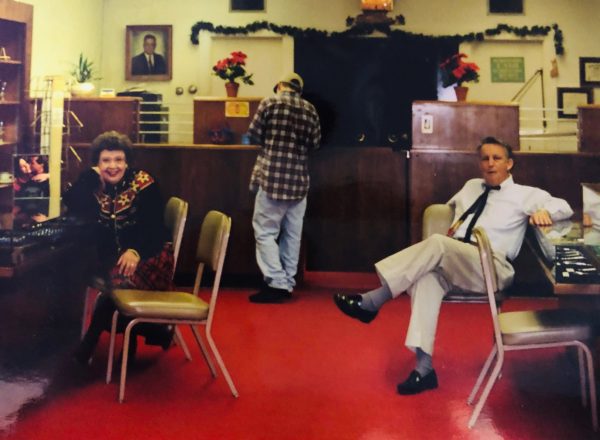Tracy Newsom Garner: Love and loss (of a small, local business)

This story is one of seven vignettes in the series Rural by Choice: Navigating Identity in the Uwharries.
Newsom’s Jewelers was a fixture on Main Street in Troy for almost 50 years. Tracy Newsom Garner’s grandfather moved from High Point to start the business in 1952, following in the footsteps of his brothers, who’d opened jewelry stores in Salisbury and Denton. His son, Charles, worked alongside him and took over the business when he died in 1972.
By 1999, Charles was ready to retire. There was an opportunity for one of his three daughters to succeed him.
Tracy, the oldest, was the most likely candidate. She helped her parents at the store throughout her youth, then went on to earn a business degree from UNC Greensboro in 1987 and study at the Gemological Institute of America. At the time, she was working for Schiffman’s Jewelers in Greensboro. But she liked her job and her life in the city, and wasn’t sure if there was a future for her or the business in a small, rural town with an economy heavily dependent on the declining textile industry.

Tracy Newsom Garner
And so she took a pass.
“If I’d known then I’d end up back in Troy, I might have tried to make it work,” she said. It’s bittersweet, but she’s glad to see new businesses such as Crawford’s Diner, Uwharrie Mercantile and The Twilight Bark opening downtown. “Hindsight is 20/20, but I’m really not sure a small business like Newsom’s could compete with a Walmart seven miles away.”
After a divorce and a stint as the single mother of two young daughters, she married Max Garner, a man who’d grown up in Montgomery County and practiced law in Troy.
Max didn’t want to leave his established practice, so Tracy has commuted to Greensboro the past 14 years. She’s held many different positions at Schiffman’s over the past three decades.
“The Schiffman family has been incredibly supportive and flexible” she said.
She typically leaves home at 7:30 and returns around 6:15. She goes to Biscoe, hits the 73/74 interstate and sets the cruise control. “It’s an easy drive,” she said. “It would be different if I was trying to get to Charlotte.” The major drawback is that she has to buy a new car every five years.
 This is one of seven vignettes about people who choose to make their lives in rural areas outside of Charlotte. Read the other parts of “Rural by Choice” online.
This is one of seven vignettes about people who choose to make their lives in rural areas outside of Charlotte. Read the other parts of “Rural by Choice” online.
Her daughters went to public schools in Montgomery County. While schools in Greensboro might have offered more opportunities, she appreciates the supportive social structure in a rural community. “You don’t get lost in the crowd, and you don’t get away with much.” Her daughters even had some of the same teachers who’d taught Tracy back in the day.
Despite her long commute, her flexibility at work allowed Tracy to fully participate in her daughters’ school events and extra-curricular activities. Having her own mom nearby was also a bonus. “She was super helpful with the girls.” Her mom is now suffering from macular degeneration and is starting to need help herself with cooking and other activities of daily living, which Tracy and her youngest sister can arrange and provide.
Tracy enjoys the diversity of people she interacts with in Greensboro, as well as keeping up with the city’s cultural events and evolving nightlife options, but sometimes her dual existence presents challenges. “I spend so much time in Greensboro, sometimes I don’t feel as connected to people here.” She misses out on shared experiences, and she brings a different perspective.
Still, she and a group of girlfriends from high school have remained close. They rent a house at the lake every year in September, and over the course of a long weekend, their bonds overcome differences.